Consultation workshop women political participation.
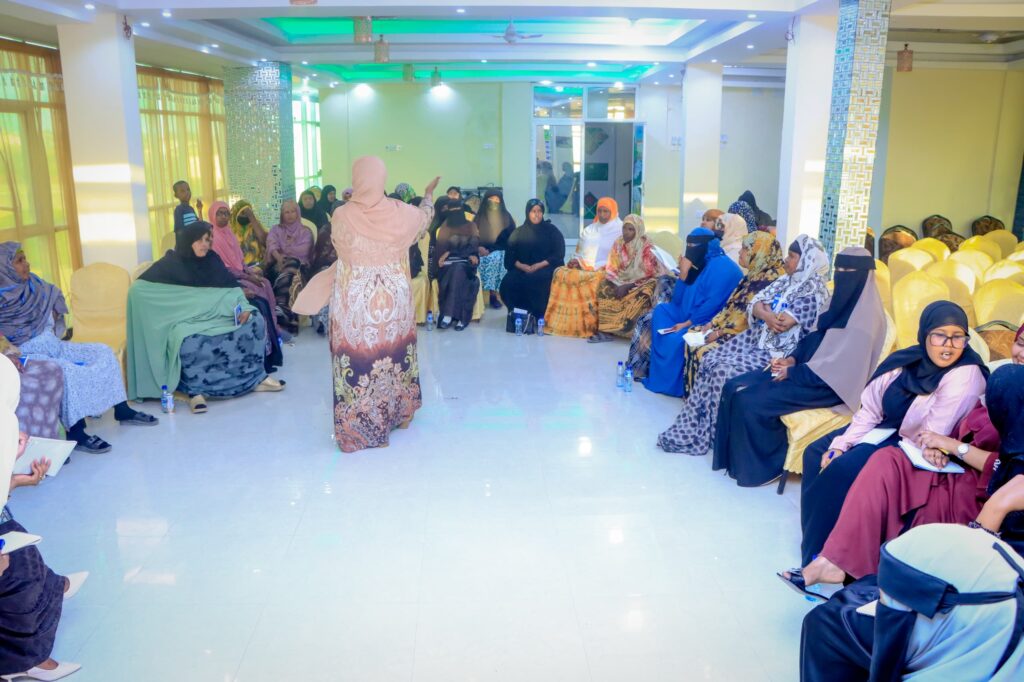
Center of inclusive accountable and good governance CIAG organized a consultation meeting on February 23, 2025, in Burao, Togdheer region, inviting 40 women to enhance their participation in the upcoming 2026 elections. This gathering brought together female political aspirants, including those who contested in previous parliamentary and local council elections but were not elected, as well as women with political ambitions for the future. The session served as a platform for dialogue, experience sharing, and strategizing to boost women’s political representation in Somaliland.
Leadership and Advocacy Training Workshop in Hargeisa
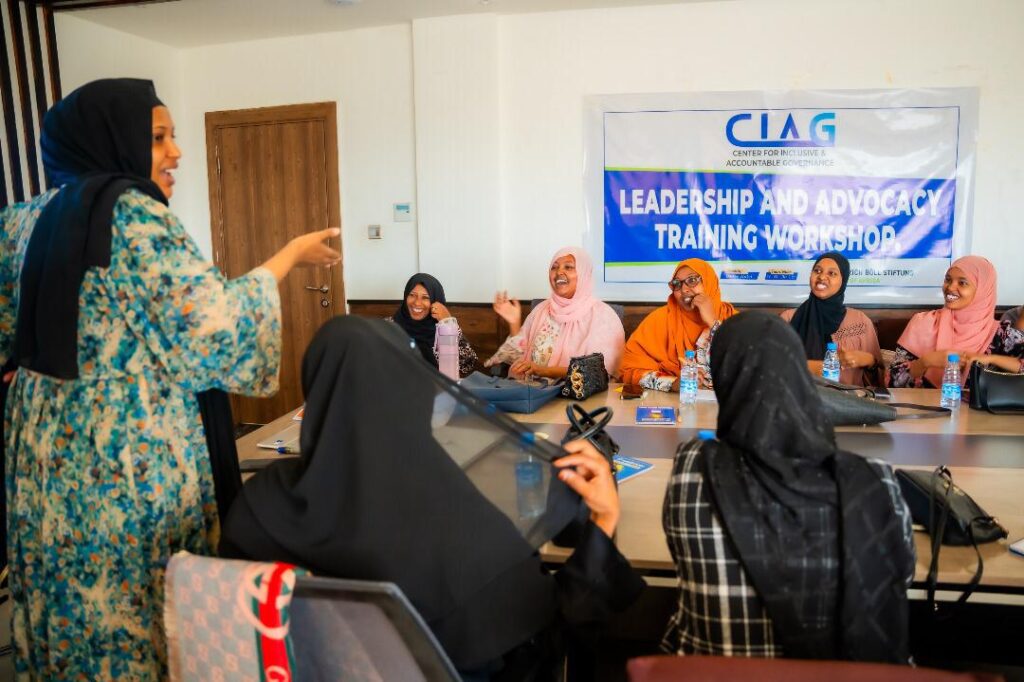
On December 24-25, 2024, under our Promoting Inclusive and Accountable Governance in Somaliland project, supported by Heinrich Boell Stiftung (HBS) International Programs, we conducted a two-day Leadership Training Workshop in Hargeisa. The workshop brought together 40 young women from various professional fields, including law, journalism, civil society organizations, and political parties. This initiative aimed to develop emerging women leaders with essential skills in leadership and advocacy, and build their confidence in addressing the systemic challenges they face in accessing decision-making roles. The workshop focused on leadership skills, covering topics such as understanding leadership styles, building self-awareness, enhancing communication abilities, and leading effective teams. Participants were also allowed to engage in interactive exercises and group discussions. Finally, the participants were given basic tools to identify policy issues, craft impactful messages, and engage with stakeholders. The workshop concluded with practical activities that enabled participants to apply their learnings in real-world scenarios.
Forum on Inclusion and Women’s Voices in Governance
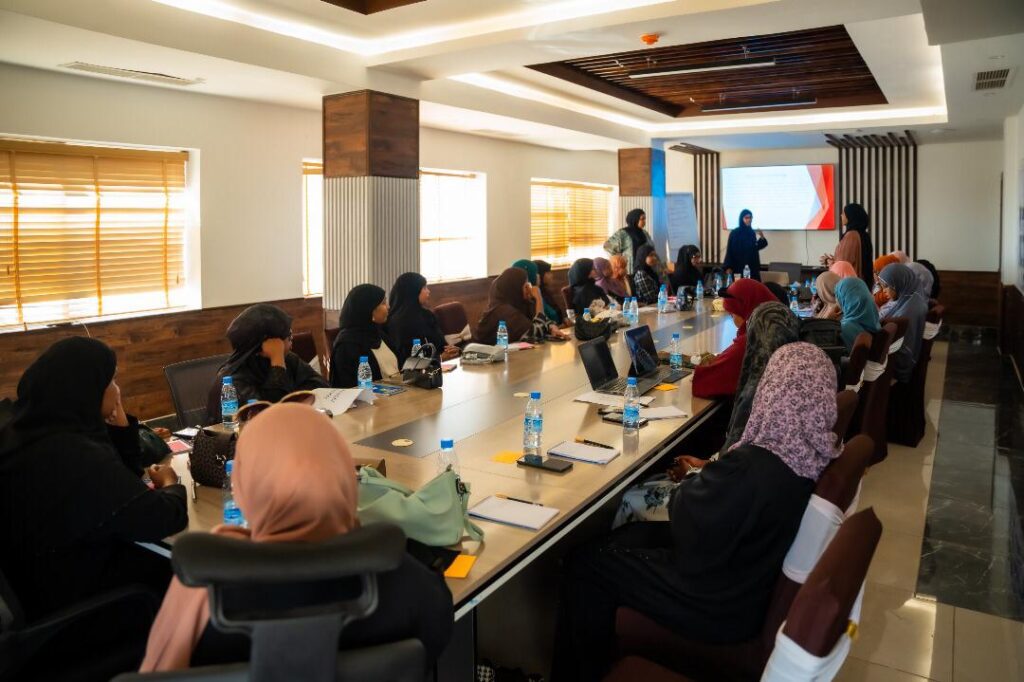
On December 10th, 2024, as part of our Promoting Inclusive and Accountable Governance in Somaliland project, supported by Heinrich Boell Stiftung (HBS) International Programs, Horn of Africa BMZ, Regional Programme, CIAG hosted the first public forum on the role of women and the newly elected government of Somaliland. Over 110 participants, including politicians, CSO activists, members of political parties, and academics attended. The purpose of the forum was to amplify women’s voices and ensure their concerns are heard. It was also intended to advocate for women’s meaningful inclusion in the newly formed government, reinforcing their role in shaping a more equitable and inclusive leadership structure. The event began with a 40-minute panel discussion featuring three speakers out of the four invited, as one did not show up due to a miscommunication of the date. Each panelist, Sacdia Muse, Dr. Nimco Mohmoud, and Member of Parliament Mukhtar Maydhane, addressed different issues in the discussions. This was followed by comments, feedback, and suggestions from the attendees. Additionally, the event was broadcast live on two national TV stations, Astaan and Horn Cable. There was also live posting on various social media outlets such as Facebook and Instagram. Sound bites of key individuals promoting the event were recorded and posted live as well. Based on the media review, close to 40,000 people viewed the event online by the next morning. Feedback and comments were positive, and this event made it possible for CIAG to go online and connect with the general public. Key issues that came out of the discussion included: • Cultural and Societal Norms: Gender stereotypes and societal expectations that limit women’s roles in politics. • Lack of Access to Power or Decision-Makers: Individuals with significant political influence are more likely to be appointed, implying that women don’t have the political clout to get there. • Lack of Support Structures: Many women do not receive mentorship or the necessary support to navigate the complex political environment, particularly in political parties’ platforms. The panelists also discussed at length the importance of gender-sensitive legislation and policies in both the government and political parties. The key aspects included: • Women Quota: The introduction of gender quotas to ensure a minimum representation of women in government bodies, which has proven successful in several countries. • Women Support Policies: Expanding policies that support women’s political participation in Somaliland to enhance women’s empowerment. • Education and Training: Empowering young women through education and leadership training to prepare them for political participation. Another issue that came out during the discussion was the need for innovative strategies to increase women’s visibility and participation in decision-making roles. The participants recommended the following: • Empowering Young Women: Through education and leadership training to prepare them for political participation and public service roles. • Inclusive Political Parties: Encouraging political parties to adopt inclusive candidate selection processes, ensuring women are given equal opportunities to run for office. • Fundraising for Political Campaigns: Teaching women how to secure funding and build a strong financial foundation for political campaigns to overcome one of their main challenges. • Social Media Campaigns: Leveraging digital platforms to raise awareness about women leaders and amplify their voices in public discourse. • Mentorship Programs: Establishing mentorship networks to guide young women in navigating political careers and leadership roles. • Building Alliances and Coalitions: How women can form strong political networks, collaborate with other political stakeholders such as traditional and religious leaders, and forge strategic partnerships with allies to further their agendas in governance and politics. In conclusion, the forum made an appeal to the new government for better allocation in terms of women’s appointments and to ensure that women’s representation becomes a central goal in all aspects of the government, as stated in their political manifestos.
Networking Workshop for Women Politicians and Activists: Fostering Dialogue and Collaboration
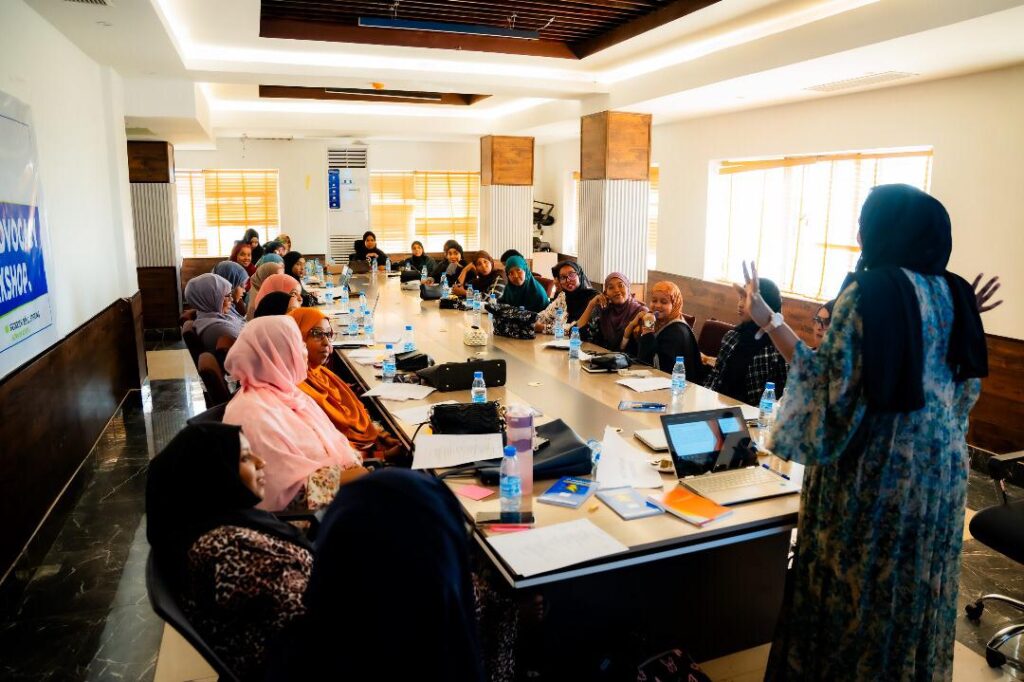
A Networking Workshop for women politicians and activists was held on November 2-3, 2024, featuring 35 women representing the three existing political parties: UCID, Wadani, and Kulmiye, along with female representatives from seven political associations, young professionals from civil society organizations, and women activists. The workshop also included several candidates from the 2021 parliamentary elections and women with over 20 years of political experience. The aim of this workshop was to promote intergenerational dialogue among women of different ages and political affiliations, advocating for gender-inclusive policies. It also sought to create networking opportunities for women engaged in political parties and associations. A participatory methodology was utilized throughout the workshop. Participants engaged with visual presentations, including photos and quotes from women public figures, both international and African. Attendees were also given the chance to share their individual experiences and insights on the subject matter. In group discussions, they tackled key challenges and proposed tangible solutions, culminating in presentations of their discussion points. This activity provided a platform for women to share their political experiences, backgrounds, years of involvement, and the issues and challenges they face as women politicians, along with potential pathways forward. Additionally, a SWOT analysis was conducted to evaluate women’s effectiveness in politics. Ultimately, participants developed practical recommendations designed to strengthen their capacities and skills to enhance their meaningful participation in politics and decision-making positions in the future.
CSO Networking Meeting: Reflecting on Roles and Strengthening Advocacy
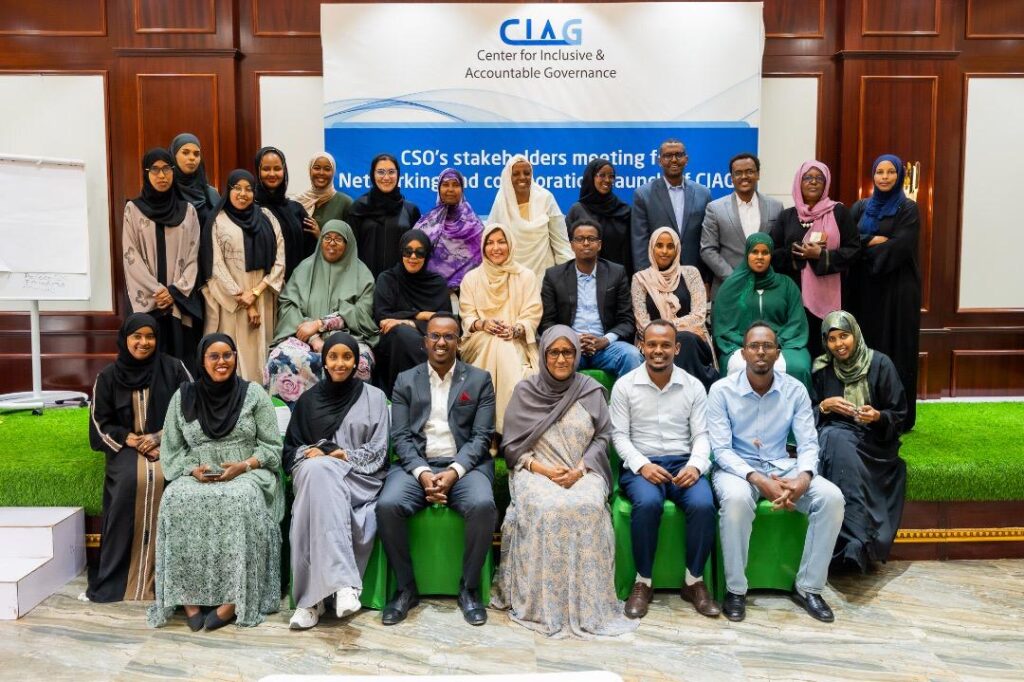
On October 9th, CIAG organized a one-day meeting for civil society organizations (CSOs) focused on networking and collaboration, with 45 participants in attendance. The purpose of the meeting was for CSOs to reflect on their roles and influence on national issues and policies, discuss challenges, and review the progress made. It also aimed to explore possible coordination among CSOs for joint and effective advocacy initiatives and lobbying. Additionally, the meeting served to launch and introduce CIAG to a wider network of CSO stakeholders. The meeting was well attended, and participants welcomed CIAG, appreciating our efforts in organizing a gathering that was greatly needed. They acknowledged their vital role in shaping the political landscape of the nation over the past decade since independence and recognized that the infrastructure for social services in Somaliland has largely stemmed from their commitment. However, this influence has waned as government institutions have grown stronger, consolidating their power in shaping both political and developmental issues. Consequently, many CSOs and networks have aligned with government structures, leading to a loss of direction and influence on key issues. This concern was reiterated during the preliminary discussions, where participants identified critical issues, challenges, and potential pathways forward.
Empowering Women in Politics: A Three-Day Workshop on Agenda Setting and Lobbying
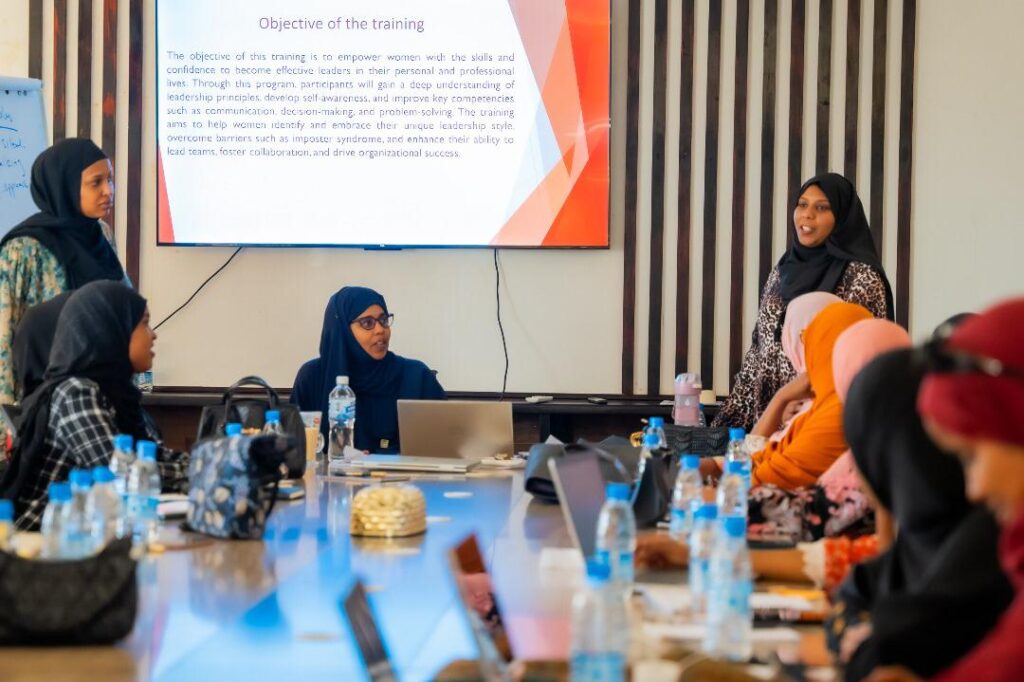
On October 5th, 2024, CIAG organized, as part of our Promoting Inclusive and Accountable Governance in Somaliland project, supported by Heinrich Boell Stiftung (HBS) International Programs, Horn of Africa BMZ, Regional Programme, a three-day workshop for 30 women from three political parties, aimed at empowering focusing on essential skills such as agenda setting, lobbying, and developing actionable plans to secure better political positions. The primary objective of this initiative was to advocate for gender quotas and other affirmative action policies that would ensure maximum representation of women in political offices among the winning party in the upcoming November 2024 presidential election. This training was thoughtfully designed to equip women politicians with the insights and tools necessary to shape their future political representation and enhance their influence within their respective parties. By strengthening their skills in advocacy and strategic planning, the workshop aims to position these women as key players in promoting higher representation in government. By the end of the workshop, each political party developed its own tailored plan to ensure better political appointments should they emerge victorious in the election. This collaborative approach not only fosters accountability but also emphasizes the importance of proactive measures in achieving gender equity in political representation.
